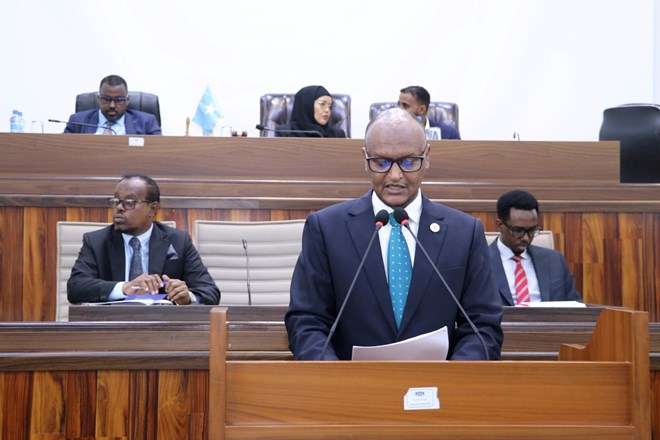Facebook Twitter (X) Instagram Somali Magazine - People's Magazine
In a historic move, Somalia’s bicameral parliament unanimously approved a new law on Saturday to establish an independent Electoral and Boundaries Commission. This marks a significant milestone in Somalia’s ongoing efforts to transition from a clan-based electoral model to a universal suffrage system.
Unanimous Vote for Democratic Reform
During a joint parliamentary session in Mogadishu, 173 members of parliament voted in favor of the law, with no opposition or abstentions recorded. The Speaker of the House of the People, Sheikh Adan Mohamed Nur Madoobe, called for expedited legislative preparations to ensure Somalia is ready for one-person, one-vote elections.
The approval follows a direct appeal from President Hassan Sheikh Mohamud, who emphasized the urgency of universal suffrage reforms. Parliament delayed its scheduled recess to prioritize the passage of this law.
Role of the Parliamentary Committee
Earlier in November, the interim parliamentary committee overseeing electoral preparations appointed former Deputy Prime Minister Mahdi Guled as chairman and Senator Iftin Hassan Iman Baasto as deputy chairman. The committee is tasked with:
Drafting regulations for elections and political organizations.
Establishing the new Electoral and Boundaries Commission.
Political Challenges and Criticism
Despite these advances, the committee’s formation has not been without controversy. MP Abdirahman Abdi Shakur criticized the move, calling it unconstitutional and arguing it undermines Somalia’s transitional government framework. These disputes underline the complexity of achieving consensus on electoral reforms in a politically polarized environment.
A Step Toward Democratic Governance
The passage of the Electoral and Boundaries Commission law is widely regarded as a critical step in Somalia’s journey toward democratic governance. The law aims to strengthen the country’s political system and establish transparent electoral processes, ensuring every citizen has a voice.
However, implementation challenges remain, as political disputes and constitutional concerns could hinder the smooth rollout of universal elections. Somalia’s leaders will need to navigate these hurdles carefully to deliver on the promise of inclusive governance.
Looking Ahead
As Somalia prepares for this historic transition, all eyes will be on the newly established commission and its ability to deliver free, fair, and credible elections. The country’s leaders and international partners will play a crucial role in ensuring the success of these reforms.

